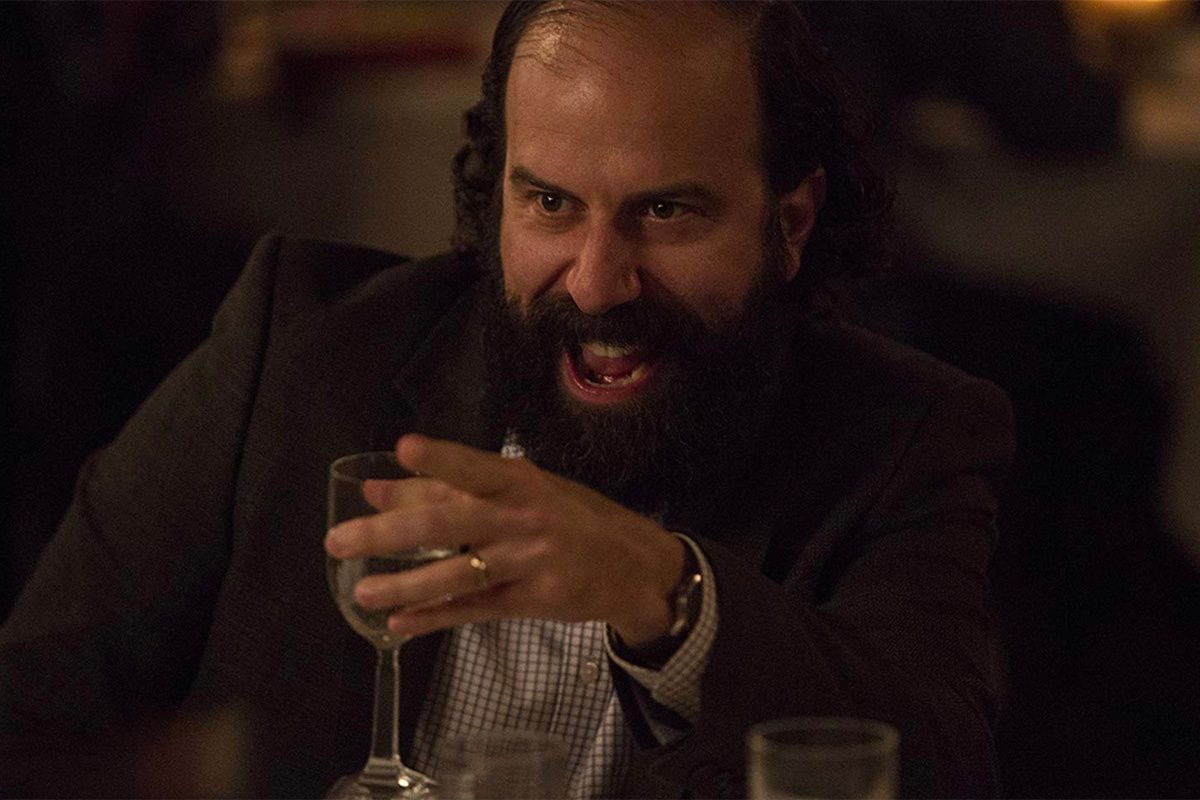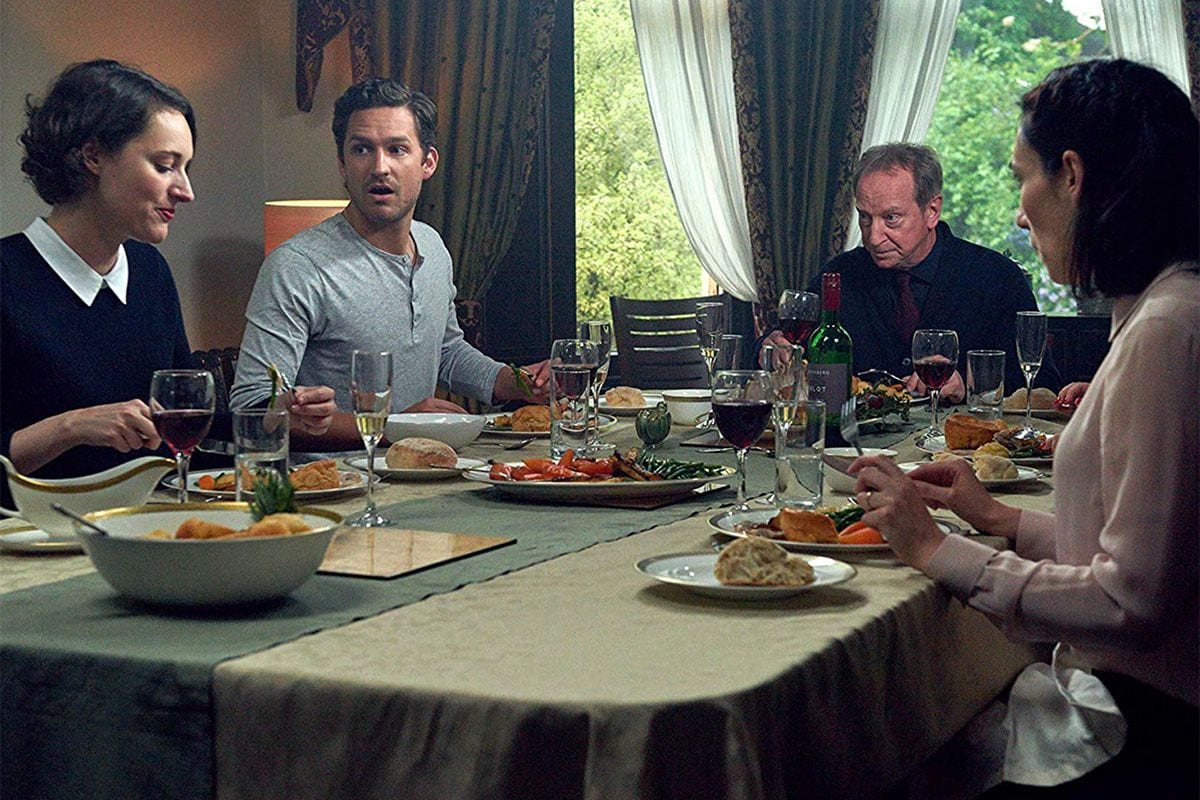When Fleabag is smoking and pressing up against the back alley of a restaurant— not to keep the place upright but to keep herself from crumbling, I almost wish I could break the fourth wall and join her for a drag. I’m not a smoker, but I have a family and I recognize that posture, that need to be alone. Because family – as joyous as reunions might be – has a habit of taking the piss out of you.
Phoebe Waller-Bridge’s Fleabag offers hilarious and searing insight into themes of love, grief, faith, loneliness, and rage. When it comes to the complicated dynamics of family, Waller-Bridge is particularly adept. So adept, in fact, that she nails it in a single pose outside a restaurant.
The occasion: “Awkward Family Dinner” episode, Season 2. Fleabag’s father (Bill Paterson as Dad) is engaged to her godmother (Olivia Colman)—now her stepmother. Her sister Claire (Sian Clifford) and her sleazy husband Martin (Brett Gelman) are also in attendance, both of whom Fleabag hasn’t seen in over a year. And there’s a priest joining the party, conspicuously like the premise of a joke setup.
Almost immediately come the laughing and sharing brought on by the glee of seeing family again. What better occasion to be social and seek approval? Claire and her husband share news of their sobriety, which won’t last past dessert. They also reveal they’re trying for a baby. “We thought you couldn’t have them,” her stepmother says, an assumption that’s news to Claire but nonetheless, she smiles through.
The initial gloss of the celebration quickly dulls. You remember why it’s been too long at the dinner table — or not long enough. An avoidant father, a blunt stepmother; the talking over each other, cutting others off, the jousting of eye contact, the conversational lull — that’s when the real party starts.
There’s something euphoric and nerve-wracking about getting reacquainted with family. We already know each other in some lateral way and can dispense with introductions and icebreakers. Family conversations, then, are like getting caught up with one another at every stage of our lives, which is why it’s easy to feel vulnerable on such occasions. Your family is there for you at your best and your worst, your successes and pitfalls, joys and outbursts. They know all about you.
Claire is commuting from Finland and that’s the conversational handoff from the engagement news. Proud of her accomplished career, Claire is cut off mid-sentence when her stepmother decides to boast about her art exhibit in Japan. Isn’t that how it always is? The thing we want to talk about is what we never get to talk about. We see Claire repress her frustration as the chatter carries on without her.
For all of the passion and personal success present at the table, Fleabag is the outcast who simply runs a café. “Going well, is it?” her father asks, everyone’s attention diverted fully to her. “It is,” Fleabag says, and her family looks on dubiously. The succinctness of Fleabag’s reply isn’t enough, the same way she doesn’t feel good enough in front of her estranged family. Claire has the envious dinner discussions of salary and promotion, while the topic of Fleabag is whether she’s “okay”.
But let’s back up a minute, or a year. They’ve been here before, which is to say they’ll likely be here again. Season 1, Episode 5: the luncheon anniversary of Fleabag’s mother’s passing. Her godmother has keenly broken out the champagne.
Fleabag’s date, who’s credited as Arsehole Guy (Ben Aldridge), asks how her father and soon-to-be stepmother met. “Through our mother, actually,” Fleabag is quick to point out, which her father is quick to deflect because it lays bare the awkward truth. He looks to his other daughter Claire like dry land, asking, “How’s work?”
Fleabag’s father might attempt to skirt the subject, but he’s not the only one. Claire is ironically avoiding the topic of work. Said Finland promotion is on the docket and she’s desperate to sort out the ramifications herself. Meanwhile, Fleabag is mincing words about the liquidation of her café— the ramifications which she, too, is determined to sort out herself. The sit down is a game of conversational hot potato, and nobody wants the fucking potato.
We might change the subject, but we can’t outwit our family’s love and attention. Parents want to fix you. Aunts and uncles want to know what you’ve been up to. Cousins want drama to chew and pass around.
“How are you?” becomes a far more loaded question; “I’m fine” is hardly enough of a reply. What’s bothering you? What’s really going on? There’s prying. And then there’s the crowbar. Everyone’s got an agenda. The dinner table is less a mutual conversation than an interrogation, or for some of us, slow asphyxiation. Even the family cat is clamoring to get out of the house.
Despite barely repressed pleading to avoid the subject, Fleabag blurts out the subject of Claire’s promotion, much to Claire’s chagrin. Her father and godmother want to hear all about it, offering their congratulations. “Fuck’s sake,” Claire utters, and she bursts. (Another family assurance: that thing you don’t want to come up, it always does.) After a brief silence, everyone resumes eating as if outbursts are par for the five-course meal.

Brett Gelman as Martin (IMDB)
Fleabag betrays Claire’s secret out of sisterly love. Claire ought to go to Finland because the promotion is clearly what she wants. But Fleabag is also steering the spotlight from herself. Fleabag’s café was a joint venture with her best friend, Boo (Jenny Rainsford), who died from an accidental suicide. The very mention of the café is a potential landmine for her with this crowd. Still, Fleabag is pleased with herself at dictating the table politics when she’s the elephant in the room.
“Your father tells me you’re struggling,” her godmother says. “I think we all are,” Fleabag’s father tries to deflect for her – another quiet act of love. “Now there’s only one of you. I can’t imagine what you’ve been through,” her godmother adds, and the levees break.
Fleabag has been repressing the memory of Boo’s suicide all throughout Season 1. You can feel her unraveling even as she maintains her table manners and dutifully participates in the conversation. This courtesy is a defense mechanism to otherwise project that she’s fine, totally fine. It’s all she can do but to excuse herself, politely, from the table.
The need to behave politely, in its own cruel and tragic way, can make us feel like we can’t say no to family. To decline, to be anti-social is rude; appearances and projecting our best selves before our relatives what we must do to convince how “okay” we say we are. We’re trapped by family. Or perhaps we trap ourselves.
If family functions were once an escape from the outside world, like Fleabag I now try to steal moments of privacy out on the balcony, patio, or in the bathroom— if only to be able to breathe. Whenever the topic of my life arises at the family gathering, I want to duck out. When my job as a writer is brought up (as in, “not a real job”), I want to down all the alcohol. Or that I’m still single – which will come up at weddings and reunions without failure – makes me want to enter witness protection.
There are no boundaries; nothing is off-topic or too personal because we’re family. No matter how many times I rehearse the conversation in my head, I’m never prepared for the interrogation. I find it easy to be brief, easier to be by myself.

Phoebe Waller-Bridge, Ben Aldridge, Bill Paterson and Sian Clifford (IMDB)
Fleabag, at least, has an audience to confide in when she breaks the fourth wall. And so we’re back at the restaurant with her – a full year since this family last got together. Fleabag had a falling out with everyone, so any reply on her part is seen as insincere, sarcastic, or desperate for attention. “I’m so intrigued to see how you’re going to make this whole evening about yourself,” Martin, Claire’s husband, antagonizes.
When her father asks about the café, we understand now that it’s a bigger question posed. How are you doing? How are you dealing with…? Two camera cuts later she’s outside coping with a cigarette and her lonesome. Fleabag is joined by her father, who hands her an envelope. “In case you’re struggling,” he says, then remarks that she’s looking quite strong. When Fleabag opens the envelope at the table, it’s not a packet of money as hoped for, but a ticket for some prepaid therapy.
Fleabag finds the courage to go back inside. It helps that there’s a priest at the table (Andrew Scott). Nothing like a man of God to keep everybody civil, for a time. “You never told me you had a sister,” the priest says to Claire “We don’t get to see each other much,” Claire deflects, Fleabag looking on. Their father aids in sidestepping the topic: “Do you see your brother?” Not even a charming priest can temper the tension between two estranged sisters.
There’s a fuss over Claire’s job title. She works in finance. Everyone thought she was a lawyer— because even when family says they’re paying attention to you, they’re not paying attention to you. “I went to business school,” Claire reminds them, then switches to Fleabag without pausing for breath: “You’re being so quiet. Why aren’t you saying anything?”
The fast roulette of the dinner table is dizzying; you get whiplash when all eyes are fixed on you again. In the end, there’s nowhere to hide because these people know us. Our parents, siblings, aunts, uncles, our cousins, and in-laws will always want to know more because they care. That’s the twisted and hilarious part about the whole deal. The prying, the interrogating, isn’t done out of malice. The attention, overbearing love is part of being a family.
The sisters in Fleabag may be combative, but they need each other. After a heated exchange, Claire retreats to the bathroom. Fleabag trails after her and learns Claire has suffered a miscarriage. Claire intends to deal with it on her own; Fleabag insists she see a doctor. When they arrive back at the table, Claire inexplicably decides to resume the celebration.
Claire doesn’t want to make a scene, so Fleabag does it for her, declaring she just had a miscarriage, and the entire table jumps in. There’s a brief solidarity amongst the family, a concern and shock shared by all. It’s an act, of course; Fleabag is only bearing the brunt of everyone’s attention to convince her stubborn sister to go to the hospital. Martin goes on to chide Fleabag’s supposed plea for attention: “She got her spotlight.”
Tempers flare. Punches are thrown. There are groans, gasps, some screaming. Those who try to help get hurt. Everybody leaves outraged. For any other family, this would be a travesty. For Fleabag and her family, it’s just part of the annual get-together.
Fleabag starts the long walk-of-shame home. She has once again distanced herself from her family, seemingly for good, when she finds Claire down the road. She’s hailed them a cab.
“This is a love story,” Fleabag says in the intro to Season 2, and the show is, in fact, a love story about a sister, a father, and a stepmother. As Claire remarks of true happiness: “It’s about opening yourself up to the people who want to love you.” We want our families to love and accept us. That love takes work… and a lot of coping.
Family can be funny, difficult, embarrassing, comforting, awkward, insufferable, and entertaining all in the same scene. Fleabag and her family are destined to do this for as long as they live. And so are we.
- Fleabag Season 1 - Official Trailer | Prime Video - YouTube
- Fleabag Season 2 - Official Trailer | Prime Video - YouTube
- Fleabag: Season 1 - Rotten Tomatoes
- Fleabag - Rotten Tomatoes
- Watch Fleabag Season 1 | Prime Video - Amazon.com
- Fleabag - Wikipedia
- Fleabag (TV Series 2016– ) - IMDb
- Phoebe Waller-Bridge - Wikipedia

